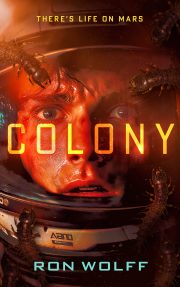The Norton Jury on the Norton Award: Why It’s Important for All SFWA Members
 This post is part of the Norton Award Blog Tour.
This post is part of the Norton Award Blog Tour.
Although the Andre Norton Award for Young Adult* Science Fiction and Fantasy relies on nominations from SFWA members just as the Nebula Awards do, the Norton also employs a jury of qualified volunteer SFWA members to help round out the ballot and ensure that outstanding works are not overlooked. We’ve asked this year’s jury to share their thoughts about the importance of the award, and what they’re looking for in this year’s crop of middle grade and young adult speculative fiction. But first, let’s meet them:
Victoria McManus (chair) reviews for Publishers Weekly and is writing a historical fantasy. She lives in Philadelphia.
Christopher Barzak is the author of the Crawford Fantasy Award winning novel, One for Sorrow. His second book, The Love We Share Without Knowing, was a finalist for the Nebula and Tiptree Awards. His short fiction has appeared in a variety of venues, including Asimov’s Science Fiction, Realms of Fantasy, Strange Horizons, Lady Churchill’s Rosebud Wristlet, The Year’s Best Fantasy and Horror, The Mammoth Book of Best New Horror, and The Year’s Best Science Fiction and Fantasy. He grew up in rural Ohio, has lived in a southern California beach town, the capital of Michigan, and has taught English in suburban and rural communities outside of Tokyo, Japan, where he lived for two years. His most recent book is Birds and Birthdays, a collection of surrealist fantasy stories. Forthcoming is Before and Afterlives, a collection of supernatural fantasies. Currently he teaches fiction writing in the Northeast Ohio MFA program at Youngstown State University. Visit him at christopherbarzak.com.
Merrie Haskell writes for all ages. Her first book, The Princess Curse, was a Junior Library Guild Selection in 2011. Her next MG novel, Handbook For Dragon Slayers is forthcoming in Summer 2013 from HarperCollins. Merrie now lives in Saline, Michigan, with her husband, stepdaughter, and too many cats named for legendary characters. Visit her at www.merriehaskell.com.
E.C. Myers has been writing science fiction and fantasy for more than eleven years and has been a proud SFWA member since 2011, when he sold his first young adult SF novel, Fair Coin. That book and its sequel, Quantum Coin, were both published this year by Pyr Books. Young adult and middle grade fiction comprise the bulk of his reading, if you don’t count the internet—which incidentally, is where you can find out more about him, especially at ecmyers.net and on Twitter @ecmyers.
Carrie Vaughn is the author of the New York Times bestselling series of novels about a werewolf named Kitty, the most recent installment of which is Kitty Steals the Show. She also wrote the young adult novels Voices of Dragons and Steel, and the novels Discord’s Apple and After the Golden Age. She’s a contributor to the Wild Cards series of shared world superhero books edited by George R. R. Martin, and her short stories have appeared in numerous magazines and anthologies. An Air Force brat, she survived her nomadic childhood and managed to put down roots in Boulder, Colorado. Visit her at www.carrievaughn.com.
Why you think the Norton Award is important for the science fiction and fantasy fields and/or for the middle grade (MG) and young adult (YA) fields?
Victoria McManus:
There are a whole slew of big name awards for MG/YA books, but none of them focus on speculative fiction, so it’s easy for books in our genre to be lost in the ocean of “best of” lists.
Having an award that is devoted only to MG/YA science fiction and fantasy helps to draw attention to future classics that might otherwise be overlooked. It also provides a handy list of winner and nominees to librarians and readers who might be new to speculative fiction.
Christopher Barzak:
The Andre Norton Award is important for both the speculative fiction community as well as the Middle Grade and Young Adult reading communities. In both cases, those communities tend to highlight the best work in their fields almost by default by age category. Young Adult and Middle Grade books are celebrated within that community, Science Fiction and Fantasy largely celebrates the best of its literature written for the adult audience each year. Occasionally there is some crossover work celebrated in both of those communities, but it’s only on occasion. The Norton Award can help bridge the gap between those two worlds, I hope, as there is good work in both fields that both age categories would be happy to swap back and forth and read.
Merrie Haskell:
There are tons of awards out there, of course, but the Norton Award is one step in filling an important gap, which is specifically recognizing how the fantastical contributes to children’s literature–and maybe even more important, how children’s literature is a vital part of speculative fiction. These are two great tastes that taste great together, and it is altogether too easy for both fields to dismiss and overlook the other.
E. C. Myers:
Some of the best science fiction and fantasy being published today is for middle grade and young adult audiences, but many adult readers are either unaware of it or choosing to ignore it. If you like sf/f and you aren’t reading MG and YA, I think you’re missing out on a very large and important part of the field; when I was young, I discovered genre fiction through children’s books, and they still serve the same role for many kids and teens today. But I don’t want people to look at books for young readers as something to “graduate” from. Yes, they can be an entry point to sf/f, but they are interesting and worthy in themselves and contributing much to the genre—and in some ways children books are helping to make the public more aware of and more accepting of genre fiction, with breakout hits like Harry Potter and The Hunger Games.
The lines between adult and young adult fiction are also blurring, with kids and adults reading on both sides of the divide, and many adult authors, like Paolo Bacigalupi, China Miéville, and Brandon Sanderson, are publishing books for readers of all ages. So I really think the Norton Award is important for the sf/f field as a way of promoting the value of children’s books and to introduce people to some of the best offerings, which will hopefully lead them to love these books as much as I do.
Carrie Vaughn:
I think the Norton Award is important because it helps the science fiction and fantasy communities find out about the great work being done in the YA/MG field right now, that often gets overlooked because of how it’s marketed (i.e. not to SF&F readers). On the flip side, it can also alert librarians, teachers, and so on that science fiction and fantasy really do have great books to offer to young readers. It bridges biases in both directions.
What are you looking for in a Norton Award-worthy book?
Victoria McManus:
I feel it is part of the jury’s mandate to be on the lookout for books that are different in some way from the bulk of books published during the year, whether in style, story, setting, or characters.
There are many excellent stories that incorporate hot trends or traditional stories, but it’s my assumption that in general those books are already garnering enough attention that the general membership of SFWA will nominate them. It’s the more unusual books, perhaps those on the edges of the genre or from smaller publishers, that tend to be overlooked, so I try to focus on reviewing those, while not forgetting about the best of the more mainstream titles.
I keep in mind the important issue of the intended readers – do I think younger readers would enjoy the book, or would they find it stale?
I also try to keep in mind the book’s potential longevity – will readers still be loving this in a decade? Two decades? Obviously, I can’t really predict that, but some books do seem to hold a sort of timelessness within their pages, eliciting a sense of wonder that will not grow stale.
I don’t have to enjoy a book to think it is different, well-written, and worthy of my nomination, but my personal enjoyment is definitely a factor in my choices, as well.
Christopher Barzak:
The kind of book that I think is Norton Award-worthy are books that are complex, that don’t become less challenging because they are written for Middle Grade or Young Adult Readers, books that have fine or even beautiful prose, or at least a style of writing that is unique or distinguished in some way from others, with complex characters with inner lives as well as outer difficulties they must deal with. It’s really the same criteria I think most awards have, which is as it should be.
Merrie Haskell:
I’m looking for a pretty specific combination of traits in a Norton-worthy book. First, I feel like it has to fit my criteria for a good MG/YA book: it can’t talk down, it has a good sense of how kids are versus how they “should be,” and it neither glosses over tween/teen emotional journeys nor overly maudlinizes them. (Yeah, maudlinize isn’t a word.) It’s a fine line to walk. If it fits that criteria, it’s already pretty good. For the Norton Award, I feel like the book has to add something to the body of sf/f children’s literature that hasn’t been seen yet, or presents a somewhat unique viewpoint. It has to contribute, not rehash.
E. C. Myers:
First and foremost, I am looking for a great book, the story that I don’t want to put down, with characters, scenes, and themes that I keep thinking about when I’m not reading it and linger with me after the last page. I’m also looking for books that exceed my expectations, that are doing something different with genre or gender or familiar tropes—basically anything that stands out because it is raising the bar just a little bit higher. It might feature a character or an idea I’ve never seen before, or handles them better than most, or twists things just enough to make it all seem fresh again. Or maybe I just love the protagonist’s voice and the writing or I connect with the story emotionally. The best books, the ones I want to recommend for the Norton Award, may accomplish many of these things, all of these things, or more—with few or no missteps. They don’t have to have an “agenda,” but I want them to be fun, exciting, engaging, moving, and often ambitious. And I also try to consider how the book helps to represent or elevate the MG/YA and sf/f fields.
This might seem like a tall order, but there are many books being published every year that qualify, and in the best of circumstances, we have a really hard time choosing only a few to recommend, let alone vote for just one winner. I’m thrilled that we have the chance to find these books and bring them to the attention of a larger audience.
Carrie Vaughn:
What am I looking for in a Norton-worthy book? Something well written, and something mind-blowingly different, which I know is kind of vague. But I really am looking for books that push the envelope, that would have blown my own mind when I was a young reader.
Nominating Books for the Norton Award
Active, Lifetime Active, and Associate SFWA members in good standing are eligible to cast a 2012 Nebula Awards Nomination Ballot. The nominating period is open from November 15, 2012 to February 15, 2013 11:59pm PST.
* Although the official title of the award is the Andre Norton Award for Young Adult Science Fiction and Fantasy, the award includes middle grade books as well.


